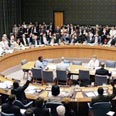Of course it has a few clauses and interpretations that are problematic from the Israeli perspective, for example the one which includes UNIFIL forces in south Lebanon according to the Lebanese government's request.
It is not yet an operation plan, whose results can be seen on the ground within days. It should also be noted at this stage that Hizbullah did not commit to obeying it.
In order for the decision to turn into a binding edict from the Security Council, there must first be agreement between the Israeli and Lebanese governments to execute it; the make-up of the international force must be decided, as well as the source of their logistical guidance and how they will be armed; and most importantly – a clear timetable by which the principles will be implemented on the ground. Without these – the decision has no practical significance.
The UN has accumulated hundreds such theoretical decisions, which were not implemented in the slightest, or were only partially implemented. For example: Resolution 242, which ended the Six Days War, has not been fulfilled to this day. Resolution 1559 from two years ago, which calls for the dismantlement of armed militias in Lebanon, is still only on paper.
The one responsible now for putting together the practical program is the UN Secretary General, Kofi Annan. The most urgent mission on his shoulders right now is to lead tough negotiations with the Israeli and Lebanese governments on the precise date on which the ceasefire will take effect.
These negotiations must establish what each side must do – or refrain from doing – after that decisive date. Simultaneously, Kofi Annan and his staff must summarize the numerous details of the multinational force as well as their timetable to deploy in south Lebanon alongside the Lebanese army.
Since it was decided that Israel would withdraw gradually as the new force deployed, the timetable must be synchronized with the coordination command center, which will be supervising the implementation on the ground.
The coordination staff will also be charged with reporting violations of the ceasefire, which will occur without a doubt. This is a crucial staff, as it will dictate both the IDF's and Hizbullah's freedom to maneuver in the next few days.
Clearing the field, at the last-minute
The negotiations will be tough, as each side will try to "bend" the UN decision to benefit it, by bargaining out the implementation details. This is exactly the reason that Israel is continuing its operation in south Lebanon with full force, against Hizbullah rocket launchers, up to the Litani River and even past it.
The military operation is intended to accomplish three goals: Apply continuous diplomatic pressure on Lebanese and UN officials so they will quickly start negotiations; minimize rocket attacks on Israel as much as possible, with the immediate goal of ensuring command over outlooks from Nabatiya, Tyre, and other sources of rocket attacks; and to clarify to the world – especially the Arab world and Iran (as well as to Israeli citizens) that the war ends when Hizbullah loses its central capabilities – and the United Nations is only saving it from crushing defeat.
IDF forces, at the first stage, are fighting the rocket launchers, after which they'll move onto Hizbullah's rocket arsenals and lethal "natural reserves" in south Lebanon. The goal at this stage is to hand over the territory to UNIFIL cleaned as much as possible of Hizbullah infrastructure. Hizbullah will no doubt try to recuperate as quickly as possible and return to launching rocket attacks to prove that its capabilities were not damaged.
This operation may turn out to be a duel-edged sword. The numerous troops deployed across south Lebanon are giving Hizbullah an opportunity to bring about IDF casualties. And if the IDF doesn't succeed in significantly reducing rocket attacks – this will be considered a failure for Israel.
Therefore, Israel has an important interest to shorten as much as possible operations between the Litani River and the "Blue Line." The process of implementing and stabilizing the ceasefire should be completed within a week, more or less.
After that, Kofi Annan has 30 more days to recruit forces and diplomatic processes to prevent Hizbullah rearmament by its patrons. Will it succeed? Only time will tell.

















